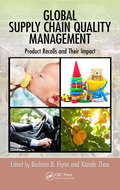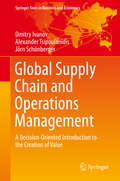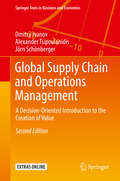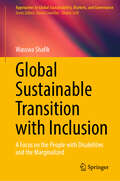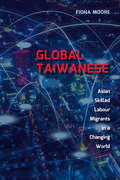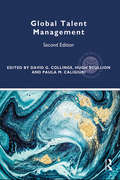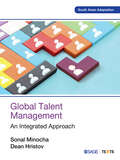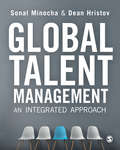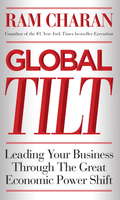- Table View
- List View
Global Supply Chain Quality Management: Product Recalls and Their Impact (Supply Chain Integration Modeling, Optimization and Application)
by Barbara B. Flynn Xiande ZhaoThis book draws together key insights from the relevant literature across diverse disciplines and presents detailed research case studies of six extended global supply chains in three industries: toys, food, and pharmaceuticals. These case studies cover U.S. companies with supply chains that extend into China and include the perspectives of U.S. and Chinese executives. The book then presents a conceptual model that synthesizes the literature and case studies, and describes the ways in which alternative product recall strategies influence consumers' perception of an organization's corporate social legitimacy and consumers' future purchasing behaviors.
Global Supply Chain Security
by Andrew R. Thomas Sebastian VaduvaThis volume presents new theoretical insights, practical strategies, and policy initiatives in the rapidly evolving field of global supply chain security. As businesses, governments, and society at large have become increasingly dependent on a global network to provide goods and services, protecting global supply chains has become an issue of vital importance for industries, nations, and regions. The "supply chain" encompasses all the links connecting a manufacturer to end users of its products. Links may take the form of plants, supplier warehouses, vendor facilities, ports or hubs, retail warehouses or facilities, and outbound shipping centers. Links also involve all the ways goods are moved-by truck, ship, airplane, or rail car. A great deal can go wrong in the supply chain due to company or systemic mismanagement and inefficiency, criminal activity, employee or technology errors, or terrorism, to name just a few of the threats. Then there are government regulation, industry or association oversight, and security agencies (both public and private) keeping track. Globalization, stricter security regimes, and increasingly sophisticated criminal activity have made cross-border cargo movements more complex, putting the integrity of end-to-end supply chains at much greater risk. This is why the security of the supply chain has become such an important issue for business people: there is too much at stake to let problems proliferate or stagnate. It has been estimated, for example, that thieves now steal $50 billion in goods each year from various points along the supply chain. Synthesizing the most current research, practical application, and policy, Global Supply Chain Security covers a range of emerging topics--from risk assessment to technology deployment to continuity planning--and will serve as a useful resource for anyone concerned with supply chain security issues, including scholars, students, business executives and policymakers.
Global Supply Chain and Operations Management
by Jörn Schönberger Dmitry Ivanov Alexander TsipoulanidisThis textbook presents global supply chain and operations management from a comprehensive perspective, combining value creation networks and interacting processes. It focuses on the operational roles in the networks and presents the quantitative and organizational methods needed to plan and control the material, information and financial flows in the supply chain. Each chapter of the book starts with an introductory case study. Numerous examples from various industries and services help to illustrate the key concepts. The book explains how to design operations and supply networks and how to incorporate suppliers and customers. As matching supply and demand is a core aspect of tactical planning, the book focuses on it before turning to the allocation of resources for fulfilling customer demands. Providing readers with a working knowledge of global supply chain and operations management, this textbook can be used in core, special and advanced classes. Therefore, the book targets a broad range of students and professionals involved with supply chain and operations management. Special focus is directed at bridging theory and practice.
Global Supply Chain and Operations Management: A Decision-Oriented Introduction to the Creation of Value (Springer Texts in Business and Economics)
by Jörn Schönberger Dmitry Ivanov Alexander TsipoulanidisThe second edition of this textbook comprehensively discusses global supply-chain and operations management, combining value creation networks and interacting processes. It focuses on the operational roles in the networks and presents the quantitative and organizational methods needed to plan and control the material, information and financial flows in the supply chain. Each chapter starts with an introductory case study, and numerous examples from various industries and services help to illustrate the key concepts. The book explains how to design operations and supply networks and how to incorporate suppliers and customers. It also examines matching supply and demand, which is a core aspect of tactical planning, before turning to the allocation of resources for fulfilling customer demands. This second edition features three new chapters: “Supply Chain Risk Management and Resilience”, “Digital Supply Chain, Smart Operations, and Industry 4.0”, and “Pricing and Revenue-Oriented Capacity Allocation”. These new chapters provide the structured knowledge on the principles, models, and technologies for managing the supply-chain risks and improving supply-chain and operations performance with the help of digital technologies such as Industry 4.0, additive manufacturing, Internet-of-Things, advanced optimization methods and predictive analytics. The existing chapters have been updated and new case studies have been included. In addition, the preface provides guidelines for instructors on how to use the material for different courses in supply-chain and operations management and at different educational levels, such as general undergraduate, specialized undergraduate, and graduate courses. The companion website www.global-supply-chain-management.de has also been updated accordingly. In addition, the book is now supported by e-manuals for supply-chain and operations simulation and optimization in AnyLogic and anyLogistix. Providing readers with a working knowledge of global supply-chain and operations management, with a focus on bridging the gap between theory and practice, this textbook can be used in core, special and advanced classes. It is intended for broad range of students and professionals involved in supply-chain and operations management.
Global Sustainability
by Benno WerlenThis book offers new perspectives of transdisciplinary research, in methodological as well as theoretical respects. It provides insights in the two-fold bio-physical and the socio-cultural global embeddedness of local living conditions on the basis of selected empirical studies from Latin America, Asia, Africa, Australia and Europe. The theoretical foundations of ecological research and sustainability policies were developed at the end of the nineteenth century. They are largely based on investigations of living spaces and the evolution and differentiation of varied life forms. This perspective is embedded in the practical and theoretical European problem situations of the past and lacks social and cultural differentiation. The transformation of spatial and natural relations as a result of the globalization process is so radical that new theories are needed to solve 21st century ecological problems. Moreover, in view of the lack of an ontologically sound and promising strategy for transdisciplinary problem solving, as well as an acceptable consideration of the power of cultural schemas relating to natural living's interpretations, there is a strong need to focus on sustainable social practices, habits and routines, rather than on predominantly living spaces or eco-topes. This book elaborates on the transdisciplinary approach by reflecting on the theoretical heritage and a global perspective of sustainability, by focusing on the primary role of a social approach in sustainability research and by putting emphasis on cultural dimension of sustainability. It postulates that global sustainability is grounded in a global understanding of our everyday activities.
Global Sustainability as a Business Imperative
by Charles Wankel James A. F. StonerThis first volume in the series addresses the pressing need to align business practices with the requirements of a sustainable world. Delivering new models for conducting business, implications of undertaking new approaches, and ways businesses are transforming and being transformed by their environments.
Global Sustainable Cities: City Governments and Our Environmental Future
by Danielle Spiegel-Feld, Katrina Miriam Wyman, and John J. CoughlinPerspectives from worldwide experts on how major cities across the globe are responding to the major environmental threats of our time, including global climate change Over half of the world’s population now lives in cities, and this share is expected to increase in the coming decades. With growing urbanization, cities and their residents face substantial environmental challenges such as higher temperatures, droughts, wildfires, and increased flooding. In response to these pressing challenges, some cities have begun to develop local environmental regulations that supplement national and environmental laws. In so doing, cities have stepped into a role that has been historically dominated by higher levels of government.Global Sustainable Cities takes stock of the policies that have been implemented by cities around the world in recent years in several key areas: water, air pollution, greenhouse gas emissions, and climate adaptation. It examines the advantages—and potential drawbacks—of allowing cities to assume a significant role in environmental regulation, given the legal and political constraints in which cities operate.The contributors present a series of case studies of the actions that seven leading cities—Abu Dhabi, Beijing, Berlin, Delhi, London, New York, and Shanghai—are taking to improve their environments and adapt to climate change. The first volume of its kind, Global Sustainable Cities is a critical comparative assessment of the actions that major cities in the global North and South are taking to advance sustainability.
Global Sustainable Transition with Inclusion: A Focus on the People with Disabilities and the Marginalized (Approaches to Global Sustainability, Markets, and Governance)
by Wasswa ShafikThis book provides a comprehensive exploration of inclusive, sustainable development, emphasizing the critical need to integrate the perspectives and needs of people with disabilities and marginalized communities into the global sustainability transition to a sustainable future. Through highlighting the intersectionality of identity and the unique challenges faced by these groups, the book addresses a pressing issue: the often-overlooked barriers that hinder their full participation in sustainable transitions. Organized into three parts, the book first contextualizes the relationship between sustainability and inclusion. It delves into the historical and theoretical frameworks that shape our understanding of marginalization, exploring how disability intersects with various social identities. This foundation sets the stage for an in-depth analysis of the United Nations Sustainable Development Goals (SDGs) and the ways in which they can be made more inclusive, ensuring that no one is left behind. The second part identifies and examines the myriad barriers to inclusion within sustainable practices. It addresses structural, socioeconomic, and cultural obstacles that perpetuate exclusion while also critiquing existing policy frameworks for their limitations in addressing the needs of marginalized populations. Through case studies, the book highlights successful initiatives and innovative practices that promote accessibility and equity, mainly through the use of assistive technologies and community engagement. In the final section, the book outlines actionable strategies for fostering inclusive, sustainable development. It emphasizes the importance of community engagement, participatory decision-making, and the empowerment of marginalized voices. Additionally, it discusses metrics for monitoring and evaluating the impact of sustainability initiatives on people with disabilities, providing a framework for accountability and continuous improvement. This book aims to bridge the gap between sustainability and social justice, offering a roadmap for stakeholders, policymakers, and practitioners committed to creating a more inclusive world. This book targets academics, policymakers, non-profit societies, and activists working at the intersection of sustainability and social equity and serves as a vital resource for those seeking to understand and promote inclusive practices in the global sustainable transition.
Global Taiwan: Building Competitive Strengths in a New International Economy (East Gate Bks.)
by Suzanne Berger Richard K. LesterGlobal Taiwan examines the impact of globalization on the industry and economy of Taiwan since the spectacular growth of the 1990s. Drawing on hundreds of interviews with firms in Taiwan, China, the United States, Japan, Europe, and other areas, the book analyzes the strengths and weaknesses of Taiwanese firms at a time when they face new competition from powerful global leaders and new producers in China. The contributors cover topics of enormous importance for Taiwan as well as the rest of the world, including transformations in the international economy, technological advances that enabled modularization and fragmentation of the production system, contract manufacturers, regionalization, and links with Chinese industry. The book addresses such questions as: Can Taiwanese companies be maintained and expanded with the same corporate strategies and public policies as in the past? Can these strategies still work for other countries? If changes are required, what resources can be mobilized in the public and private sectors? As massive relocation of manufacturing and services moves plants and jobs to low-wage countries like China and India, what will remain at home in societies like Taiwan?
Global Taiwanese: Asian Skilled Labour Migrants in a Changing World
by Fiona MooreIn Global Taiwanese, Fiona Moore explores the different ways in which Taiwanese expatriates living in London and Toronto, along with globally networked professionals living in Taipei, use their shared Taiwanese identities to construct and maintain global and local networks. Based on a three-year-long ethnographic study that incorporates interviews with people from diverse backgrounds, generations, and histories, Global Taiwanesethis book explores what their different experiences tell us about migration in "tolerant" and "hostile" regimes. Global Taiwanese considers the implications in leveraging their of the Taiwanese case for understanding the processes by which transnational professionals more generally use Taiwanese ethnic identity for both business and personal purposes. in their business and personal lives. As people become increasingly mobile, ethnic identity becomes more important as a means of negotiating transnational encounters; however, at the same time, the opportunities it offers are rooted in local cultural practices, requiring professionals and other migrants to develop complex social strategies that link and cross the global and local levels. With rich ethnographic detail, this book contributes to the understanding of the migrant experience and how it varies from location to location, how migration more generally changes in response to wider socioeconomic factors, and, finally, of the specific case of Taiwan and how the distinctive nature of its diaspora emerges through wider discourses of Chineseness and pan-Asian identity.
Global Talent Management
by Akram Al ArissThis book bridges the research and practice of global talent management. It opens important theoretical and practical avenues to understand the concept internationally while focusing on developing and emerging countries. Chapters derive from various geographic regions and embrace cross-national, comparative, and interdisciplinary perspectives. An open and inclusive approach is used in assessing the challenges of global talent management, strategies to overcome these challenges, and in charting opportunities for future talent management. These three dimensions are crucial to academic researchers and business practitioners for envisioning a positive future role of talent management in businesses and societies.
Global Talent Management
by Hugh Scullion David CollingsThis book draws on recent theoretical contributions in the area of global talent management and presents an up to date and critical review of the key issues which MNEs face. Beyond exploring some key overarching issues in global talent management the book discuses the key emerging issue around global talent management in key economies such as China, India, the Middle East and Eastern Europe. In contrast to many of the currently available texts in the area of global talent management which are descriptive and lacking theoretical rigor, this text emphasizes the critical understanding of global talent management in an organizational context. Drawing on contributions from the leading figures in the field, it will aid students, practitioners and researchers alike in gaining a well grounded and critical overview of the key issues surrounding global talent management from a theoretical and practical perspective.
Global Talent Management (Global HRM)
by Hugh Scullion Paula Caligiuri David G. Collings<p>The second edition of Global Talent Management (GTM) offers a state of the art overview of the key areas of talent management in theory and practice. Drawing on contributions from the leading global contributors to talent management research, the book is structured around three key sections. Section one provides a contextual overview of talent management. The second section explores in depth some of the core areas of GTM practice which includes the meaning of talent in the global context, internal talent identification, developing leadership talent, employee turnover, employer branding and the role of the corporate HR function in GTM. The final section considers three key contemporary issues in GTM, namely, data analytics in GTM, managing virtual talent and managing globally diverse talent. <p>The chapters in the volume provide advanced undergraduate or postgraduate students with an interest in global talent management with a cutting-edge overview of the key topics in the field. It is also an invaluable resource for the reflective practitioner looking for an overview of key research in this important area of practice.
Global Talent Management at Novartis
by Jordan SiegelThis case tackles the topic of global talent management. It can be used to analyze the performance measurement, incentive, and talent development system used at a major multinational company. This case can also be used to analyze the extent to which this system should or should not be adapted for China and other emerging economies.
Global Talent Management: An Integrated Approach
by Sonal Minocha Dean HristovA holistic overview of key global talent management perspectives, which determine the inter-linked nature of individuals as global talent, organisations as hubs for global talent and policies across sectors and industries This textbook discusses the current organisational approaches to the attraction, development and retention of global talent, and encourages critical reflection of how global talent management is affected by policy, society and the economy. The authors draw on interdisciplinary fields, practical insights from global employers and wide-ranging case studies to help students grasp the complexities of this evolving field. Going beyond organisations and their relationship with the emergent disciplines, the book highlights the need to develop the 'self' as a global talent, develop competencies and attributes to become future-ready in a fast-paced and highly competitive global labour market. Key Features: • International, cross-disciplinary and cross-industry approach through the use of contemporary cases as illustrative examples • Insights for students on how to confidently navigate through a range of cultural, generational and technological disruptions • Content closely considers current agendas such as the global talent mismatch, demographic disruptions and the role of global talent in shaping cities, regions, economies and societies
Global Talent Management: An Integrated Approach
by Dr Sonal Minocha Mr Dean HristovThis textbook provides the theory and practice context of Global Talent Management within an accessible conceptual framework for students, spanning individuals (micro), organisations (meso) and policy (macro). Including discussions on the development of self as global talent and current organisational approaches to the attraction, development and retention of global talent, this book encourages critical reflection of how global talent management is affected by policy, society and the economy. The authors draw on interdisciplinary fields, practical insights from global employers and wide-ranging case studies to help students grasp the complexities of this evolving field.
Global Talent Management: An Integrated Approach
by Dr Sonal Minocha Mr Dean HristovThis textbook provides the theory and practice context of Global Talent Management within an accessible conceptual framework for students, spanning individuals (micro), organisations (meso) and policy (macro). Including discussions on the development of self as global talent and current organisational approaches to the attraction, development and retention of global talent, this book encourages critical reflection of how global talent management is affected by policy, society and the economy. The authors draw on interdisciplinary fields, practical insights from global employers and wide-ranging case studies to help students grasp the complexities of this evolving field.
Global Talent: Skilled Labor as Social Capital in Korea
by Gi-Wook Shin Joon Nak ChoiGlobal Talent seeks to examine the utility of skilled foreigners beyond their human capital value by focusing on their social capital potential, especially their role as transnational bridges between host and home countries. Gi-Wook Shin and Joon Nak Choi build on an emerging stream of research that conceptualizes global labor mobility as a positive-sum game in which countries and businesses benefit from building ties across geographic space, rather than the zero-sum game implied by the "global war for talent" and "brain drain" metaphors. The book empirically demonstrates its thesis by examination of the case of Korea: a state archetypical of those that have been embracing economic globalization while facing a demographic crisis-and one where the dominant narrative on the recruitment of skilled foreigners is largely negative. It reveals the unique benefits that foreign students and professionals can provide to Korea, by enhancing Korean firms' competitiveness in the global marketplace and by generating new jobs for Korean citizens rather than taking them away. As this research and its key findings are relevant to other advanced societies that seek to utilize skilled foreigners for economic development, the arguments made in this book offer insights that extend well beyond the Korean experience.
Global Technology Management 4.0: Concepts and Cases for Managing in the 4th Industrial Revolution
by Pratim Milton DattaTechnology is pervasive in today’s globalized world. Moreover, technology and globalization drive competitiveness and strategy, and must be managed well. This textbook uses technology management as the central theme to cover multiple business and social facets, including digital transformation, cybersecurity, international operations, marketing, finance, culture, human capital, and the political economy. The book is divided into four sections. Part 1 examines the confluence of globalization and technology from the first Industrial Revolution to the current Fourth Industrial Revolution. Part 2 introduces strategic and analytical metrics and models that are crucial to managerial decision-making. Part 3 discusses the basics of cybersecurity and combating cyber-threats to protect organization and its stakeholders. Part 4 focuses on sustainable operations, global projects, and digital transformation in a technology-centric, globalized world. The book will help students learn how to navigate business aspects of globalization and technology in the 4th Industrial Revolution (4IR). For instructors, the learning objectives and discussion questions help guide students in grasping the material.
Global Technology and Corporate Crisis: Strategies, Planning and Communication in the Information Age
by Simon Moore Mike SeymourAccelerating global change is generating a volatile, shifting and potent array of risks and threats for business and corporate management. If business is to survive and recover, the authors argue that a major shift is needed that embraces corporate culture, operational planning and the key role of communication in the information revolution. This innovative text meets this challenge head on. It includes informed insights into the implications for strategic planning, management and communications handling for companies facing serious issues and crisis situations in tomorrow’s corporate world. With a wide-ranging review of the information and communications revolution, and a forecast of future parameters for planning and execution of crisis management, this book will be invaluable reading for all those involved in the strategic management of technology and corporate communications.
Global Technology: Summary of a Forum
by Steve OlsonBeginning JavaScript with DOM Scripting and Ajax is an essential resource for modern JavaScript programming. This completely updated second edition covers everything you need to know to get up-to-speed with JavaScript development and add dynamic enhancements to web pages, right from the basics. As well as focusing on client-side JavaScript, you will also learn how to work with the Browser Object Model, the Document Object Model (DOM), how to use XML and JSON as well as communicate with service side scripts such as PHP. Find out how to: Construct good JavaScript syntax following modern coding practices Use JavaScript to communicate with the server and retrieve data Dynamically manipulate markup, validate forms and deal with images Debug applications using features inside the browser JavaScript is one of the most important technologies on the web. It provides the means to add dynamic functionality to your web pages and serves as the backbone of Ajax-style web development. Beginning JavaScript with DOM Scripting and Ajax will take you from being a JavaScript novice to work freely with this important technology - begin your JavaScript journey today! What you'll learn What functions, variables, events and objects are and how to use them. How build a site that will still work in the case that JavaScript is turned off. How to access and update part of the page using code. How to use JavaScript to communicate with the server and retrieve data. How to use JavaScript to for form validation and user feedback. How to use Third-Party Libraries like jQuery. Who this book is for Beginning JavaScript with DOM Scripting and Ajax is for the person who has a good grasp of HTML and CSS but wants to add JavaScript to their skillset. If you want to learn some basic programming concepts, have experience but need help updating your skills, or you're coming from another language, Beginning JavaScript with DOM Scripting and Ajax can help. Table of Contents Getting Started with JavaScript Data and Decisions From DHTML to DOM Scripting HTML5 and JavaScript Presentation and Behavior (CSS and Event Handling) Common Uses of JavaScript: Image and Windows JavaScript and User Integration: Navigation and Forms Back-End Interaction with Ajax and Node. js Data Validation Techniques Modern JavaScript Case Study: A Dynamic Gallery Using Third-Party JavaScript Appendix A: Debugging JavaScript
Global Tensions: Challenges and Opportunities in the World Economy
by Lourdes Benería Savitri BisnathAgainst the backdrop of demonstrations in Seattle, Porto Alegre and Genoa and within the context of growing resistances to free trade and the current global trends, Global Tensions takes a close look at the challenges posed by the processes of globalization at the beginning of the twenty-first century. Composed of original essays by renowned scholars, this volume explores controversial topics such as free trade, women's rights, labor standards, the World Trade Organization and global tensions.
Global Theme Park Industry
by Salvador Anton ClavéSince the 1980s, the theme park industry has developed into a global phenomenon, with everything from large, worldwide theme parks to countless smaller ventures. From the first pleasure gardens to the global theme park companies, this book provides an understanding of the nature and function of theme parks as spaces of entertainment. Illustrated throughout by worldwide case studies, empirical data and practical examples, the book portrays the impacts of theme parks as global competitive actors, agents of global development and cultural symbols, particularly in the context of their role in the developing experience economy.In conclusion, this book is a practical guide to the planning and development of theme parks.
Global Themes and Local Variations in Organization and Management: Perspectives on Glocalization
by Gili S. Drori Markus A. Höllerer Peter WalgenbachGlobal Themes and Local Variations in Organization and Management: Perspectives on Glocalization offers a broad exposition of the relations between the global and the local with regard to organizational and managerial ideas, practices, and forms. This edited volume forges ahead to capture the complexity of modern management and organization that results from the processes of glocalization. Universality is among the core underlying principles of the management of organizations, as well as of organization and management science itself. Yet, reality reveals enormous variation across social and cultural contexts. For instance, multinational corporations must adjust their management practices to adhere to national regulation and local standards; manufacturers and service providers routinely tailor their products to suit the local preferences of consumers; and non-profit organizations amend their advocacy agenda to appeal to local sentiments. The work assembled here goes beyond merely describing such patterns of variation and adaptation in organization and management; research and commentary engage directly with the tensions between homogeneity and heterogeneity, convergence and divergence, global and local. With contributions from leading scholars in the field of comparative organization studies, this collection offers a substantive contribution to the investigation of organization and management, as well as providing a valuable resource for students of organization studies, international business, and sociology.
Global Tilt: Leading Your Business Through the Great Economic Power Shift
by Ram CharanThe world's economic center of gravity has shifted. Permanently. Do you know what it now takes to succeed? The global tilt is nothing less than an irreversible shift of economic power--jobs, wealth, and market opportunities--from a small part of the world to its entirety. It is improving the lives of millions of people around the world, and while it is creating immense opportunities, it is disrupting the world as you know it with dizzying speed. If you're an American or European, any assumptions you may have about national and managerial superiority are obsolete. Businesses in China, Singapore, India, Brazil, Malaysia, and other countries on the move have ready access to the capital and expertise they need to grow. Their leaders have just as much knowledge, talent, and drive as you do. And they are unleashing their entrepreneurial verve to scale up fast and grab once-in-a-lifetime opportunities. These businesses will soon be competing with yours everywhere on the planet, even if you're not aware of them yet. Finding opportunities of your own requires you to consider vastly different perspectives and to see the new global landscape in its entirety and then change the content of your work to pursue them. In Global Tilt, New York Times bestselling author Ram Charan gives business leaders the guidance they need to succeed in a tilted world, including:- Gaining an edge by cutting through the complexity of demographics, different forms of government, and even the global financial system, to identify "unstoppable trends" better and sooner than others- Challenging your reliance on core competence and the incremental improvement that results. Instead, look "outside-in" and "future-back," determine the capabilities you need to build, and muster the psychological fortitude to make occasional strategic bets that can potentially alter the competitive landscape - Developing the soft skills crucial to leading a global organization, including mastering local contexts- Equipping the organization to win by facing up to painful but necessary shifts in people assignments, decision-making authority, and resource allocation--even before making structural changes Those who can pursue the opportunities in a tilted world have a remarkably bright future. Ram Charan's unparalleled experience with global leaders and companies and the unique and powerful insights he brings to this book will light the way for you and your exciting journey. From the Hardcover edition.
